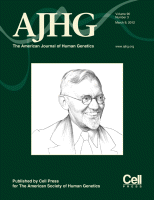导读:一个以英国科学家为主的科研团队发现,一种从妈妈遗传得来的变异可以使婴儿的出生体重增加93g,而若是从外祖母遗传得来的,那么可以使出生体重增加155g。

科学家说,一种基因突变会使婴儿的出生体重增加,最多可达到155g(5.5盅司)。
PHLDA2基因一直被认为是一种生长阻遏剂,能够减轻婴儿的出生体重。
但是一个以英国科学家为主的科研团队发现,一种从妈妈遗传得来的变异可以使出生体重增加93g (3.3盅司),而若是从外祖母遗传得来的,那么可以使出生体重增加155g。
更多细节发表在The American Journal of Human Genetics期刊上。
论文作者是伦敦大学学院的Gudrun Moore教授及其同事,他们一共对从妈妈和她们的孩子采集到的将近9,500个DNA样本中的 PHLDA2基因进行了研究,这些样本分别从3个独立的研究获取得来。
他们发现一种叫做RS1的基因突变型似乎可以改变该基因的作用方式,从而导致更高的出生体重。
“作为一种生长阻遏剂,PHLDA2基因对婴儿的出生体重有着举足轻重的影响。” Moore说。
“我们发现,PHLDA2的一个突变型如果是从妈妈继承而来,那么宝宝的出生体重会增加93g左右;如果是从妈妈的妈妈(外祖母)继承而来,那么将会增加115g左右。”
在志愿者中,携带RS1突变型的人占总数的13%,其余87%的 人则携带RS2突变型。
“我们认为,只在人类身上发现的、更为普遍的RS2基因型是自然选择的结果——生出更为‘小巧’的宝宝可以减轻妈妈在分娩时的痛苦,降低风险指数。” Moore说道。
“从进化层面来讲,爸爸并没有参与这个过程。这可能与妈妈分娩时,爸爸的存活并未受到影响有关。”
基因“被沉默”
PHLDA2基因只有从妈妈继承而来时才会起作用,如果是从爸爸继承而来就会保持“沉默”。父系基因的沉默由DNA周围的分子决定的,这种现象可用表观遗传学来解释。
目前,科学家们也无法对此做出科学的解释,但他们推测,这可能与确保妈妈安全分娩有关。
英国纽卡斯尔大学的Caroline Relton博士说:“尽管这项研究者只对出生体重进行了研究,但是也许这种遗传变异会对婴儿们产生长远的健康影响。”
“事实上,与极端出生体重相关的长期健康影响很可能与这个基因以及其他相关遗传因子有关。”

Maternal Inheritance of a Promoter Variant in the Imprinted PHLDA2 Gene Significantly Increases Birth Weight
Miho Ishida, David Monk, Andrew J. Duncan, Sayeda Abu-Amero, Jiehan Chong, Susan M. Ring, Marcus E. Pembrey, Peter C. Hindmarsh, John C. Whittaker, Philip Stanier and Gudrun E. Moore
Birth weight is an important indicator of both perinatal and adult health, but little is known about the genetic factors contributing to its variability. Intrauterine growth restriction is a leading cause of perinatal morbidity and mortality and is also associated with adult disease. A significant correlation has been reported between lower birth weight and increased expression of the maternal PHLDA2 allele in term placenta (the normal imprinting pattern was maintained). However, a mechanism that explains the transcriptional regulation of PHLDA2 on in utero growth has yet to be described. In this study, we sequenced the PHLDA2 promoter region in 263 fetal DNA samples to identify polymorphic variants. We used a luciferase reporter assay to identify in the PHLDA2 promoter a 15 bp repeat sequence (RS1) variant that significantly reduces PHLDA2-promoter efficiency. RS1 genotyping was then performed in three independent white European normal birth cohorts. Meta-analysis of all three (total n = 9,433) showed that maternal inheritance of RS1 resulted in a significant 93 g increase in birth weight (p = 0.01; 95% confidence interval [CI] = 22–163). Moreover, when the mother was homozygous for RS1, the influence on birth weight was 155 g (p = 0.04; 95% CI = 9–300), which is a similar magnitude to the reduction in birth weight caused by maternal smoking.
文献链接:https://www.cell.com/AJHG/abstract/S0002-9297(12)00106-1








